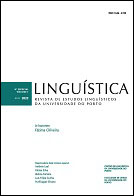Verbal aspect in Croatian and Portuguese – searching for interlinguistic grammar
Abstract
Starting from the relevant points of the Croatian aspectual system, we present a basic scheme of contrasts between the perfective/imperfective opposition in Croatian and Pretérito Perfeito/Imperfeito in Portuguese and analyze narrative texts written by B2 level Portuguese students, who are native speakers of Croatian. Focused on “deviations”, we try to identify the specificities of the interlanguage in question with regard to the use of the past verbal tenses, namely Pretérito Perfeito and Imperfeito. The occurrence of Imperfeito in the foreground of the narrative and in the coda, as well as the combination of this verbal tense with the simple durative adverbials point to the presence of some L1 features in narrative texts produced by our informants – just as in Croatian, the interlinguistic Imperfeito seems to have the unmarked status in the Pretérito Perfeito/Imperfeito opposition.
References
Bardovi-Harlig, K. (2000). Tense and aspect in second language acquisition: Form, meaning, and use. Blackwell.
Bardovi-Harlig, K. (2013). Research design: From text to task. In M. R. Salaberry, & L. Comajoan (Eds.), Research Design and Methodology in Studies on L2 Tense and Aspect (pp. 219-270). De Gruyter Mouton.
Baĭić, I., & Majerović, M. (2013). “It happened” rather than “it was happening” - problems in conceptualizing the core meanings of the progressive aspect in English. In A. Peti- Stantić, & M. M. Stanojević (Eds.), Jezik kao informacija (pp. 223-238). Hrvatsko druĭtvo za primijenjenu lingvistiku (HDPL), 223-238.
Coimbra I., & Coimbra, O. M. (2012). Gramática Ativa 1. Lidel Edições.
Comajoan, L. (2013). Chapter 9. Defining and coding data: Narrative discourse grounding in L2 studies. In M. R. Salaberry, & L. Comajoan (Eds.), Research Design and Methodology in Studies on L2 Tense and Aspect (pp. 309-356). De Gruyter Mouton.
Corder, S. P. (1967) The Significance of Learners’ Errors. International Review of Applied Linguistics in Language Teaching, 5, 161-170. (reimpresso em Corder S. P. (1981). Error Analysis and Interlanguage. Oxford University Press.)
Corder, S. P. (1971). Idiosyncratic dialects and error analysis. IRAL: International Review of Applied Linguistics in Language Teaching, 9(2), 147-160. (reimpresso em Corder S. P. (1981). Error Analysis and Interlanguage. Oxford University Press.)
Dickey, S. (1999). Expressing Ingressivity in Slavic: The Contextually-Conditioned Imperfective Past vs. the Phase Verb stat’ and Procedural za-. Journal of Slavic Linguistics, 7(1), 11–44.
Dickey, S. (2000). Parameters of Slavic aspect. a cognitive approach. CSLI publications.
Forsyth, J. (1970). A Grammar of Aspect: usage and meaning in the Russian verb. In Dennis Ward (Ed.) Studies in the modern Russian language. Cambridge University Press.
Goodin-Mayeda, C. E. & Rothman, J. (2007). The acquisition of aspect in L2 Portuguese & Spanish: Exploring native/non-native performance differences. In S. Baauw, F. Drijkoningen, & M. Pinto (Eds.), Romance Languages and Linguistic Theory (pp. 131- 148). Benjamins Publications.
Grønn, A. (2008). Imperfectivity and complete events. In F. Josephson, & I. Söhrman (Eds.), Interdependence of Diachronic and Synchronic Analyses (pp. 149-165). John Benjamins Publishing Company.
Kotlar, M., & Beriĭić Antić, D. (2014). Ovladavanje imperfektom u nastavi talijanskog jezika. Strani jezici, 43(1), 19-48.
Mañas, I. N. (2016). La adquisición de Ka oposición imperfecto/indefinido por parte de estudiantes rusófonos de nivel avanzado de español LE [Tese de Doutoramento]. Universidade de Barcelona.
Oliveira, F. (2003). Tempo e Aspeto. In M. H. M. Mateus, A. M. Brito, I. Duarte, I. H. Faria, S. Frota, G. Matos, F. Oliveira, M. Vigário, & A. Villalva, Gramática da Língua Portuguesa (pp. 127-178). Caminho.
Oliveira, F.; Silva, F.; Sarić, D., & Lanović, N. (2021, no prelo). Pretérito Imperfeito e Pretérito Perfeito do Indicativo: alguns contextos de uso problemáticos para estudantes croatas de português. Studia romanica et anglica zagrabiensia, 66.
Sancho, I. I. & Castillo, S. B. (2002). Dificultades de los estudiantes rusos durante el proceso de aprendizaje de E/LE. Carabela, (52), 61-77.
Sarić, D. (2014). Aspekt u portugalskom i hrvatskom: primjer procesa i kulminiranih procesa [Tese de Doutoramento]. Universidade de Zagreb.
Sarić, D. (2016). Teličnost u hrvatskom. Filologija, (65), 131-147.
Sarić, D. (2018). Kulminirane aktivnosti u portugalskom i hrvatskom. In M. Ljubičić, N. Lanović, M. Musulin, P. Radosavljević, & S. Šoĭtarić (Eds.), Poglavlja iz romanske fiKoKogije: u čast akademiku Augustu Kovačecu o njegovu 80 (pp. 597-609). FF press.
Selinker, L. (1972). Interlanguage. International Review of Applied Linguistics, 10(3), 219-231.
Downloads
Published
Issue
Section
License
Copyright (c) 2022 Linguística: Revista de Estudos Linguísticos da Universidade do Porto

This work is licensed under a Creative Commons Attribution-NonCommercial 4.0 International License.



